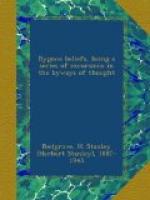In other accounts the Philosopher’s Stone, or at least the materia prima of which it is compounded, is spoken of as a despised substance, reckoned to be of no value. Thus, according to one curious alchemistic work, “This matter, so precious by the excellent Gifts, wherewith Nature has enriched it, is truly mean, with regard to the Substances from whence it derives its Original. Their price is not above the Ability of the Poor. Ten Pence is more than sufficient to purchase the Matter of the Stone. . . . The matter therefore is mean, considering the Foundation of the Art because it costs very little; it is no less mean, if one considers exteriourly that which gives it Perfection, since in that regard it costs nothing at all, in as much as all the World has it in its Power . . . so that . . . it is a constant Truth, that the Stone is a Thing mean in one Sense, but that in another it is most precious, and that there are none but Fools that despise it, by a just Judgment of God."[1] And JACOB BOEHME (1575—1624) writes: “The philosopher’s stone is a very dark, disesteemed stone, of a grey colour, but therein lieth the highest tincture."[2] In these passages there is probably some reference to the ubiquity of the Spirit of the World, already referred to in a former quotation. But this fact is not, in itself, sufficient to account for them. I suggest that their origin is to be found in the religious doctrine that God’s Grace, the Spirit of CHRIST that is the means of the transmutation of man’s soul into spiritual gold, is free to all; that it is, at once, the meanest and the most precious thing in the whole Universe. Indeed, I think it quite probable that the alchemists who penned the above-quoted passages had in mind the words of ISAIAH, “He was despised and we esteemed him not.” And if further evidence is required that the alchemists believed in a correspondence between CHRIST—“the Stone which the builders rejected”—and the Philosopher’s Stone, reference may be made to the alchemical work called The Sophic Hydrolith: or Water Stone of the Wise, a tract included in The Hermetic Museum, in which this supposed correspondence is explicitly asserted and dealt with in some detail.
[1] A Discourse between Eudoxus and Pyrophilus, upon the Ancient War of the Knights. See The Hermetical Triumph: or, the Victorious Philosophical Stone (1723), pp. 101 and 102.
[2] JACOB BOEHME: Epistles (trans. by J. E., 1649, reprinted 1886), Ep. iv., SE III.
Apart from the alchemists’ belief in the analogy between natural and spiritual things, it is, I think, incredible that any such theories of the metals and the possibility of their transmutation or “regeneration” by such an extraordinary agent as the Philosopher’s Stone would have occurred to the ancient investigators of Nature’s secrets. When they had started to formulate these theories, facts[1] were discovered which appeared to support them; but it is, I suggest, practically impossible to suppose that any or all of these facts would, in themselves, have been sufficient to give rise to such wonderfully fantastic theories as these: it is only from the standpoint of the theory that alchemy was a direct offspring of mysticism that its origin seems to be capable of explanation.




